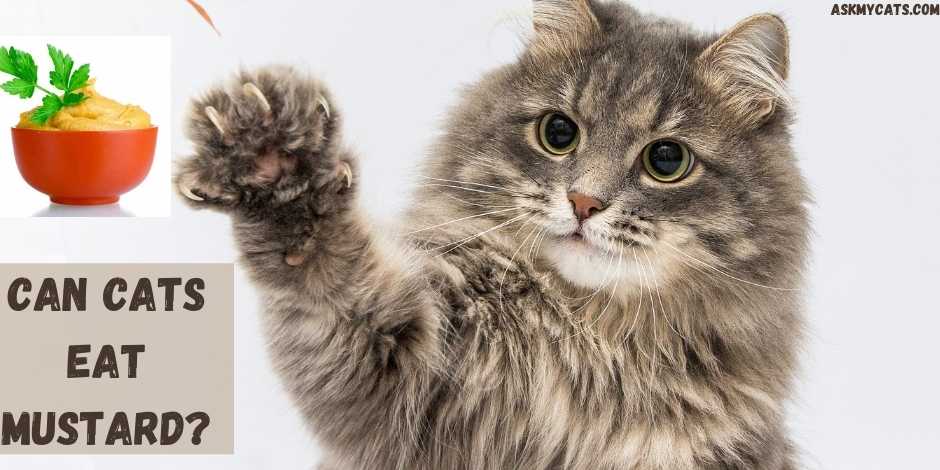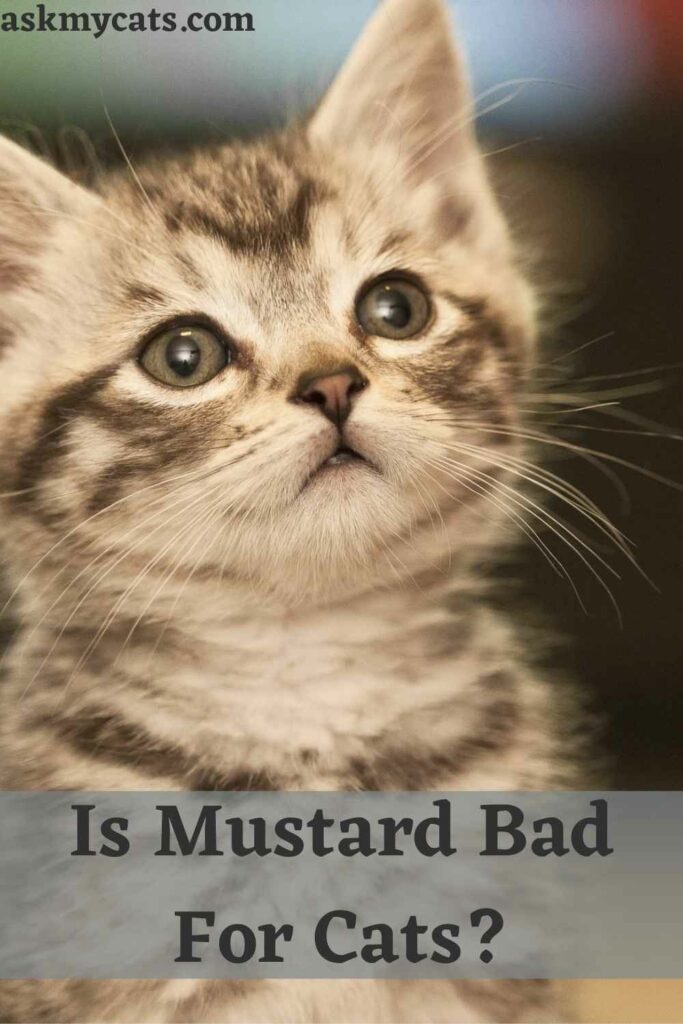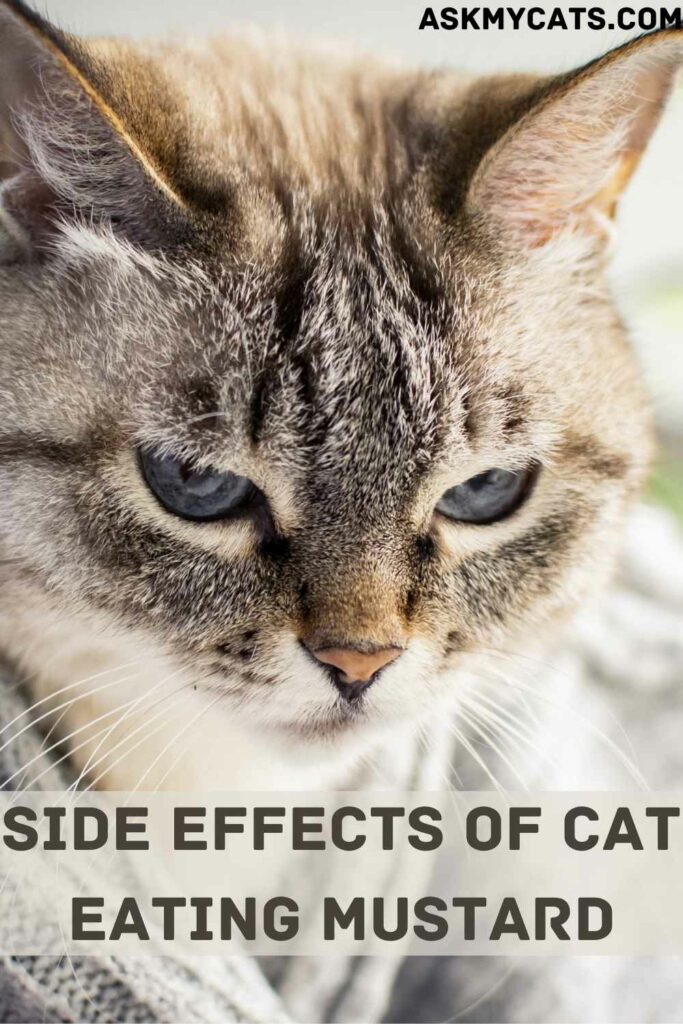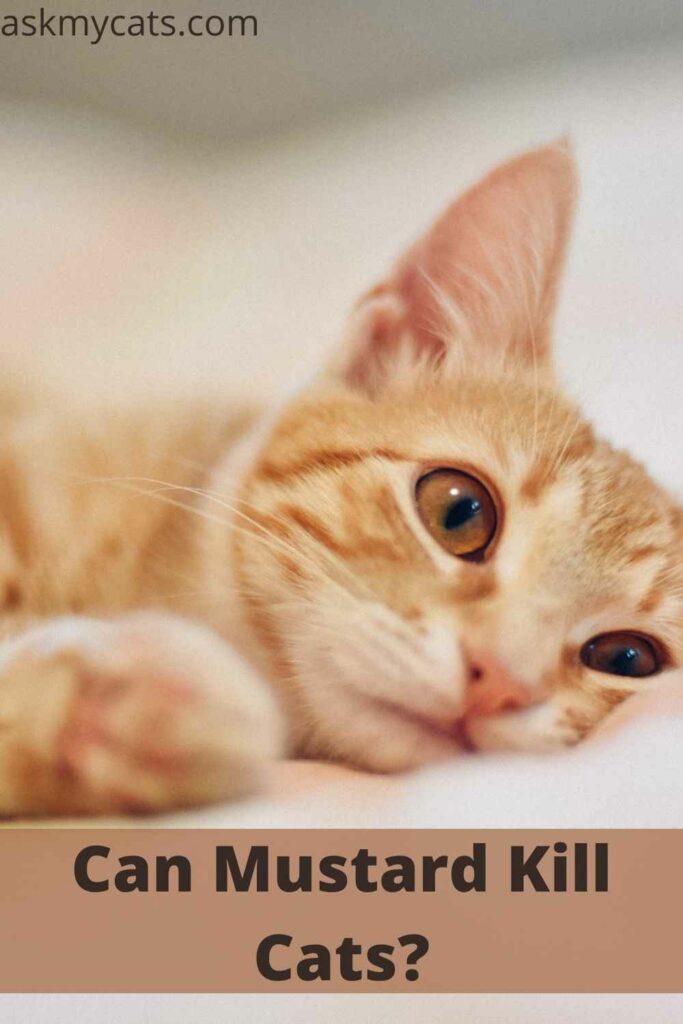Mustard is a popular element in our everyday cooking. We use mustard to give the dish a spicy kick. It’s also in sauces, spice mixes, and mayonnaise, among other things. Mustard is commonly used in human diets because it has various health benefits. However, can your cat eat mustard?
The quick answer is no; cats should not consume mustard. Ingesting the mustard seeds is dangerous for cats and can cause a variety of health problems. Furthermore, it frequently contains extra substances that are toxic to cats.
Keep reading this article to know if you can feed your cat mustard and its effects on your feline friend.


Give Your Cat the Perfect Day
Get the Free Ebook!
Ingredients Present In Mustard
The main ingredient of mustard is the seeds of the mustard plant.
Mustard is a condiment prepared from mustard plant seeds. The mustard’s flavor and strength are determined mainly by the type of seed used, although other substances are also included in the production.
Most of us are familiar with the yellow variety that goes on hotdogs or on the side of our plates, but there are many more spicy and flavorful varieties available.
Brown deli-style mustard, which is also popular in the United States, is spicier. Other mustards are spicy or fiery and carry a punch.
If your cat ate mustard, make a note of whatever type they ate in case they have any adverse side effects later.
Can Cats Eat Mustard Greens?
No, cats should not be fed mustard greens as it can upset your cat’s stomach.
It is essential to know if these greens are safe for cats because they are a common vegetable in many cuisines worldwide, including African, Italian, Chinese, Korean, Nepali, Japanese, and Indian.
Mustard greens are the leaves of the mustard plant. They’re high in nutrients and can be utilized in a variety of cuisines. Cats, on the other hand, are a different story.
Cats should not eat mustard greens since they will induce stomach distress.
Mustard greens are not listed as toxic to cats or dogs by the ASPCA, but they are harmful to cats. While opinions on their safety vary, we can confirm that mustard greens are not toxic to cats and dogs because the isothiocyanates that make them poisonous to horses do not affect dogs or cats.
However, because mustard greens are high in oxalic acids, you should only give them to your cat as a rare treat.
Also, give your cats cooked or ground vegetables to help with digestion. Remember that they don’t have teeth like ours to chew their food, and their enzymes for dealing with plant material are less active.
Can Cats Have Yellow Mustard?
Although yellow mustard is not toxic to cats, it is recommended to be avoided as it can cause an upset stomach.
Mustard comes in a variety of forms. The most popular type of mustard is yellow, commonly known as American Yellow Mustard. It’s primarily made of yellow mustard seeds, with some vinegar and turmeric thrown in for good measure.
Yellow mustard isn’t suggested for cats, despite being the mildest of all the mustard varieties. This is because, like all other varieties, it might induce gastrointestinal trouble.
The Spicy Brown Mustard is the second mustard variety. Because it’s prepared with coarsely crushed brown mustard seeds, it’s spicier and hotter than the yellow variety.
Because it contains more seasonings, Spicy Brown Mustard is said to be more dangerous than American Yellow Mustard.
Is Mustard Bad For Cats?
Mustard can prove to be bad for cats if not fed in moderation as it can cause severe gastroenteritis, characterized by persistent vomiting and diarrhea.

To determine the safety of this condiment, we must first determine whether the seeds are poisonous or contain any other potentially dangerous substances.
We know it has wine, vinegar, lemon juice, salt, spices, flavorings, water, and other liquids in addition to the crushed seeds.
Cats are unable to consume mustard because a component of the popular condiment can cause acute gastroenteritis, which is characterized by persistent vomiting and diarrhea.
You can see why it’s dangerous because it’s created from seeds.
It contains salt, which should be avoided in any diet given to your cats, in addition to the seeds.
Our salt tolerance is far higher than your feline’s.
It also contains alcohol, in the form of a specific wine, which is harmful to cats and can induce diarrhea, vomiting, breathing difficulties, poor coordination, abnormal blood acidity, central nervous system depression, tremors, coma, or even death.
All of this means that you should not feed your feline mustard or any dish containing this condiment, as it is possibly dangerous or toxic to them, and it enters the list of foods that are harmful to cats, such as raisins.
What Happens If My Cat Eats Mustard?
After eating mustard, some cats can suffer from vomiting and diarrhea.
You’ll need to keep an eye on your cat for a few hours if you know they have eaten mustard. There’s probably nothing to be concerned about, especially if it was only a tiny amount.
It’s wise to keep an eye on them, though. When cats are unwell, they are pretty good at isolating themselves, so keep an eye on them.
You’ll probably see your cat pawing at their face and licking a lot to try to get rid of the flavor that’s stuck in their jaws.
It will assist if you can persuade them to drink some water. However, we all know how difficult it is to get cats to drink. They usually have an upset stomach if they are pacing and acting restless.
If you get close enough and listen carefully, you might hear some gurgling or bubbling noises. This indicates that anything could come out of either end, so stock up on cleaning supplies.
The worst of it should be diarrhea or vomiting. The tummy rumbles should subside as long as your cat drinks and eats regularly within a 24-hour period.
Side Effects Of Cat Eating Mustard
Side effects of cats eating mustard include vomiting, indigestion, diarrhea, and internal damage.

1. Vomiting
If your cat eats mustard seeds, it may vomit for a long time.
It will be highly hazardous to a cat since some chemicals will be problematic for the cat to digest.
In this instance, you must exercise extreme caution.
The situation might quickly deteriorate if a cat continues to vomit for several hours.
Your cat may get weak and require medical attention. It can cause gastric pain by affecting the level of stomach acids.
2. Indigestion
Your cat may act abnormally after consuming a large amount of spicy food or mustard.
When a cat licks its paws repeatedly, it is indicating that it dislikes the flavor. In this circumstance, you should insist on your cat drinking some water.
You might hear strange noises coming from your cat’s tummy. That’s a symptom that your cat’s stomach is disturbed, and it needs to be treated right away.
However, there is no need to be concerned because the pain will subside within a few hours of taking the drug.
3. Diarrhea
Certain health issues cause diarrhea in cats, which is quite dangerous. Mustard consumption is not suitable for a cat’s digestion, and they suffer from stomach distress and vomiting as a result.
This could result in an infection in your cat’s stomach.
In the worst-case situation, this infection leads to diarrhea. Cats with this condition require a lot of attention and medicine. This sickness has an effect on a cat’s immune system.
4. Internal Damage
Internal harm can occur in a cat who has diarrhea and vomiting after eating mustard. You may not see it at first, but it will become apparent when some time has passed.
If your cat has been through such scenarios on a regular basis, there is a reason to be concerned.
There may be internal harm in your cat’s body that will become apparent after a period of time. As a result, you should have your cat’s body checked by a professional. If any difficulties are discovered, effective treatment is required.
Can Mustard Kill Cats?
No, mustard cannot kill a cat as it is not toxic to them. However, it is advised not to feed your cat mustard as it can result in an upset stomach.

Even while mustard isn’t toxic or dangerous to cats, it’s still not a good idea to feed it to them.
Cats should avoid most human meals and sauces in particular.
Preservatives, additives, and other unfamiliar compounds are nearly certain to upset their stomach.
Cats are meat-eaters, and they don’t care for flavors, condiments, or sauces the way we do.
They devour animals they catch in the wild and acquire all of the nourishment they require from their kills.
The Dijon Mustard is the other mustard category. It is distinguished from the American Yellow by the use of white wine instead of vinegar.
Can cats, on the other hand, consume Dijon mustard? Dijon mustards are a no-no for cats since the white wine used is actually worse than vinegar.
Honey Mustard is another option, and as you might think, it’s the most appetizing of all the mustard varieties. Is honey mustard, on the other hand, safe for cats?
Honey mustard is just as dangerous as other types of mustard, despite its sweet and pungent flavor. Additionally, because honey mustard is more enticing to cats, you should be cautious when storing it in your home.
Their over-the-counter goods have been precisely engineered to provide all of this nourishment without the need for a kill.
While you can incorporate some treats and different meals to spice up their diet and keep it exciting for them, mustard should be avoided.
Precautions You Should Take
The precautions you can take in order to keep your cat’s health good are: –
- You must take care of mustard seeds because you are already aware of their dangers. It can be pretty dangerous to your cat. As a result, you should keep a close eye on your cat’s activities.
- You should keep mustard sauce or mayonnaise away from your cat. It also creates harmful effects on your cat. It creates the same consequences as mustard does.
- To protect your cat from getting diarrhea, keep mustard and mustard-containing dishes away from him. Mustard must be kept in a secure location in your kitchen, out of reach of your cat.
- Your unclean dinnerware must be kept away from your cat. You may have noticed cats licking unclean supper or lunch plates. As a result, you must exercise caution and keep it out of the reach of your cat.
- When you’re out and about with your cat, others may offer your cat food. For the sake of your cat’s health, it is preferable to avoid such circumstances.
Check out more details about Can Cats Eat Mayonnaise? Is Mayo Bad For Cats?
Frequently Asked Question
Can mustard improve bone health in cats?
Ans. Yes, mustard can help in improving bone health in cats as it contains an abundance of selenium. Cats’ bones deteriorate and weaken as they get older. Apart from age-related bone loss, cats can also develop other bone diseases, such as osteomyelitis, which is commonly caused by bacterial infections. Fortunately, mustard may aid in the strengthening of your cat’s bones. Mustard seeds are high in selenium, a mineral that has been shown to benefit bone health by making them stronger and longer-lasting Stronger bones mean fewer injuries while playing or fending off attackers. Selenium can help your cat’s teeth, hair, and claws, in addition to strengthening his bones.
Can mustard improve a cat’s cardiovascular health?
Ans. Mustard can help to improve a cat’s cardiovascular health. Cats, like people, are susceptible to a variety of cardiovascular diseases. And the treatments that physicians usually recommend for treating these illnesses are similar for both humans and cats. Several studies published in the journal Cardiovascular Drugs and Therapy suggest that mustard oil may reduce the incidence of acute myocardial infarction. In layman’s terms, mustard lowers the risk of a heart attack, which is one of the leading causes of cardiovascular disease. Mustard is high in omega-3 fatty acids, which are responsible for mustard’s potential to help with cardiovascular health.
Is mustard good for a cat’s skin and fur?
Ans. Yes, mustard can be good for your cat’s fur and skin. Mustard seeds are high in antibacterial characteristics, which aid in healing skin blemishes while rejuvenating and moisturizing the skin. Mustard oil is particularly high in vitamins A and E, omega-3 and omega-6 fatty acids, and calcium, all of which help to promote healthy skin and fur.
Final Words
Even though mustard isn’t as harmful to cats as other foods like onions, it’s still a good idea to keep it out of your cat’s reach.
Even if there are no risks of adverse effects, mustard lacks the nutritional components that your feline companion may require.
If any unanswered questions, ask us in the comments section.
